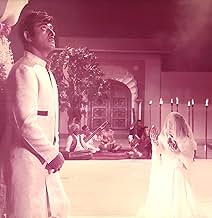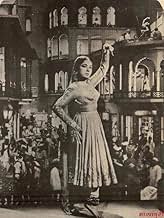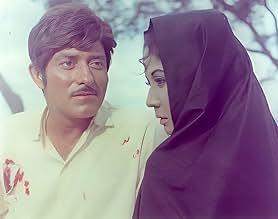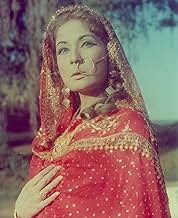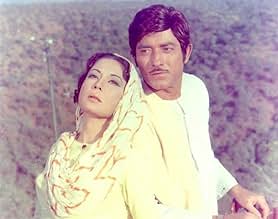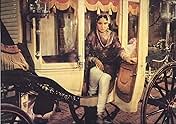Pakeezah
- 1972
- 2 Std. 27 Min.
IMDb-BEWERTUNG
7,2/10
1925
IHRE BEWERTUNG
Füge eine Handlung in deiner Sprache hinzuIn Lucknow at the turn of the century, a dancer and courtesan believes that her pure soul and body will enable her to find true love and honor.In Lucknow at the turn of the century, a dancer and courtesan believes that her pure soul and body will enable her to find true love and honor.In Lucknow at the turn of the century, a dancer and courtesan believes that her pure soul and body will enable her to find true love and honor.
- Auszeichnungen
- 1 Gewinn & 4 Nominierungen insgesamt
D.K. Sapru
- Hakim Saab
- (as Sapru)
Empfohlene Bewertungen
Well what can you say about a movie like this,well there is only one word amazing, as i speak "urdu" i understand the language very well, the dialogue's in this movie are excellent and of course the poetry(especially when "rajkumar" enters the train).This movie is about the fake pride build in contemporary Indian societies families and the famous "nawabs" of that era.
The movie gets the start not that well however after the 10min the dialogues the songs will keep you entertained This is movie which will sweep you off with its music dance and script.This is all time favourite
The movie gets the start not that well however after the 10min the dialogues the songs will keep you entertained This is movie which will sweep you off with its music dance and script.This is all time favourite
This movie is one among the very few Indian movies, that would never fade away with the passage of time, nor would its spell binding appeal ever diminish, even as the Indian cinema transforms into the abyss of artificially styled pop culture while drill oriented extras take to enhancing the P.T. styled film songs.
The cinematography speaks of the excellent skills of Josef Werching that accentuate the monumental and cinema scope effect of the film in its entirety.
Gone are the days of great cinema, when every scene had to be clipped many times and retakes taken before finalizing it, while meticulous attention was paid in crafting and editing the scenes. Some of its poignant scenes are filled with sublime emotional intensity, like the instance, when Meena Kumari refuses to say "YES" as an approval for Nikah (Marriage Bond) and climbs down the hill while running berserk in traumatized frenzy. At the moment, Raj Kumar follows her, and a strong gale of wind blew away the veil of Kumari and onto the legs of Kumar........
Kamal Amrohi shall always be remembered with golden words in the annals of Indian Cinema's history for endeavoring to complete this movie in a record setting 12 years. He had to manage filming of some of the vital songs without Meena's close ups, because Meena Kumari, the lady in the lead role was terminally ill and fighting for her life in early 1971.
The cinematography speaks of the excellent skills of Josef Werching that accentuate the monumental and cinema scope effect of the film in its entirety.
Gone are the days of great cinema, when every scene had to be clipped many times and retakes taken before finalizing it, while meticulous attention was paid in crafting and editing the scenes. Some of its poignant scenes are filled with sublime emotional intensity, like the instance, when Meena Kumari refuses to say "YES" as an approval for Nikah (Marriage Bond) and climbs down the hill while running berserk in traumatized frenzy. At the moment, Raj Kumar follows her, and a strong gale of wind blew away the veil of Kumari and onto the legs of Kumar........
Kamal Amrohi shall always be remembered with golden words in the annals of Indian Cinema's history for endeavoring to complete this movie in a record setting 12 years. He had to manage filming of some of the vital songs without Meena's close ups, because Meena Kumari, the lady in the lead role was terminally ill and fighting for her life in early 1971.
10lance-20
Perhaps the most polished and accomplished of all Indian films - Pakeezah does not fall into any of the traps commonly associated with Bollywood film (ie tackiness, farce, wholesale and unsuccessful imitation of western film themes/genres). Pakeezah is indigenous to the Sub-Continent and authentic, almost Madam Butterfly-like in plot. Characters are well-developed, direction, although sometimes unrefined by today's standards, perceptive and convincing. The Urdu-speaking milieux at the time of Pakeezah were masters of understatement and how the dialogue conveys the subtleties of the age! The acting (particularly the 'looks' and the dynamic between characters) are a delight to behold although the nuances may be lost on contemporary viewers or those not acquainted with the mores and customs of Muslim India.
Coupled, with a captivating screenplay is a beautiful musical score, enhanced by the protagonist displaying eminent command of classical Indian dance (kathak). As is the case with most romantic tragedies, the heroine must die, but she does not take her leave of the audience without the viewer feeling he/she has been party to a truly memorable cinema experience. Pakeezah is surely the pinnacle of what Indian cinema has produced and is unlikely to be paralleled.
Coupled, with a captivating screenplay is a beautiful musical score, enhanced by the protagonist displaying eminent command of classical Indian dance (kathak). As is the case with most romantic tragedies, the heroine must die, but she does not take her leave of the audience without the viewer feeling he/she has been party to a truly memorable cinema experience. Pakeezah is surely the pinnacle of what Indian cinema has produced and is unlikely to be paralleled.
Pakeezah has a very interesting history (which is well documented in the 'Trivia' section) about how it came to be. It seems as if destiny conspired to test Kamal Amrohi (the director) while at the same time secretly desiring to see him complete his masterpiece.
Pakeezah rides on metaphors, poetry and visual elocution. As a result the intensity with which emotions come out achieve a dimension which may not be very real but are very effective and leave an impact on the viewer.
Meena Kumari lives the tragedy of Nargis and Sahib Jaan like her own. The other stars of the film, besides her, are Ghulam Mohammed (the music director), Lata Mangeshkar, Naushad (background score) and Joseph Wirsching (the d.o.p). Their music and cinematography leaves you spell bound.
Pakeezah is a classic in world cinema. It reveals new layers to you every time you watch it again. Kamal Amrohi is one of the rare poets of cinema and he left us all a gift.
Pakeezah rides on metaphors, poetry and visual elocution. As a result the intensity with which emotions come out achieve a dimension which may not be very real but are very effective and leave an impact on the viewer.
Meena Kumari lives the tragedy of Nargis and Sahib Jaan like her own. The other stars of the film, besides her, are Ghulam Mohammed (the music director), Lata Mangeshkar, Naushad (background score) and Joseph Wirsching (the d.o.p). Their music and cinematography leaves you spell bound.
Pakeezah is a classic in world cinema. It reveals new layers to you every time you watch it again. Kamal Amrohi is one of the rare poets of cinema and he left us all a gift.
10lotus-9
This is definitely one of the best movies I've ever seen-- it has everything-- a genuinely touching screenplay, fine actors that make subtlety a beautiful art to watch, an actually elegant romance (it's a shame that that kind of romance just doesn't seem to exist anymore), lovely songs and lyrics (especially the final song), an artistic score, and costumes and sets that make you want to live in them. The ending was only a disappointment in that I was expecting a spectacular film to have a brilliant end-- but it was still more wonderful then the vast majority of movies out there. Definitely check this movie out-- over and over again. There are many details you miss the first time that deserve a second look.
Wusstest du schon
- WissenswertesIt took 14 years for this film to be completed. To begin with, the film was launched in 1958, jointly planned by Kamal Amrohi and 'Meena Kumari'. It was launched in black-and-white, but when colour came in vogue, Amrohi scrapped those portions already shot and decided to start again. Later, Cinemascope came into vogue, and Amrohi acquired a Cinemascope lens from MGM and scrapped the plain colour portions too. Then Amrohi and Kumari separated in 1964, bringing filming to an indefinite halt. Finally, the film was resumed in 1968, and though by then Kumari was suffering from alcoholism and was in critical condition, she was still Amrohi's only choice and she agreed to complete the film.
- Zitate
Salim Ahmed Khan: [in a note to Sahibjaan] Aapke paon dekhe, bahut haseen hai. / Inhe zameen par mat utariyega, maile ho jayenge.
[Saw your feet; they are very beautiful. / Don't place them on the ground, they will get dirty]
- VerbindungenFeatured in Ek Number Ka Chor (1990)
Top-Auswahl
Melde dich zum Bewerten an und greife auf die Watchlist für personalisierte Empfehlungen zu.
- How long is Pakeezah?Powered by Alexa
Details
- Laufzeit
- 2 Std. 27 Min.(147 min)
- Seitenverhältnis
- 2.35 : 1
Zu dieser Seite beitragen
Bearbeitung vorschlagen oder fehlenden Inhalt hinzufügen

